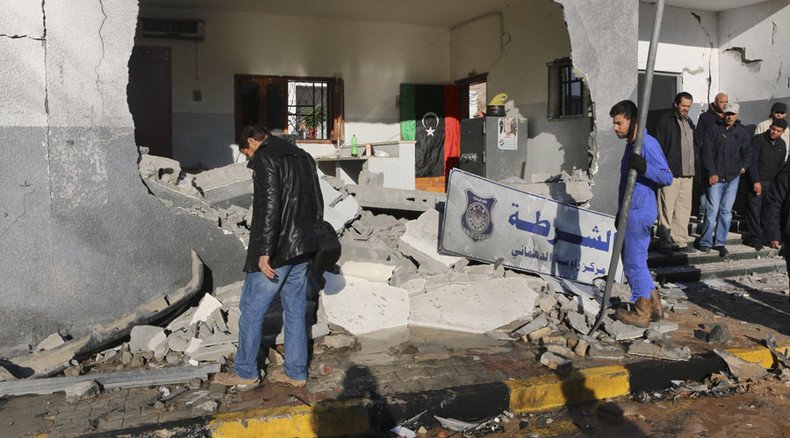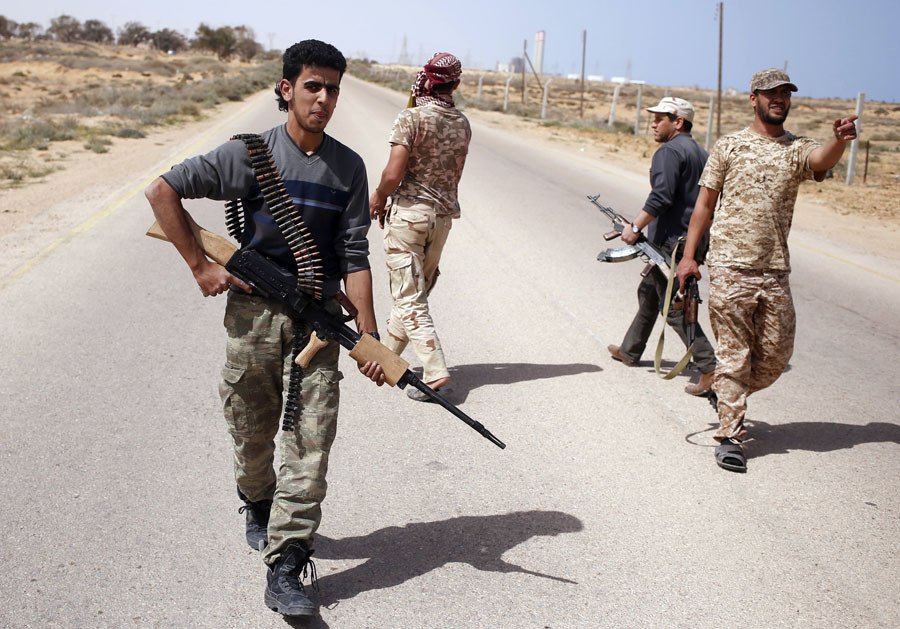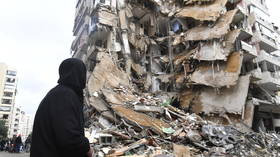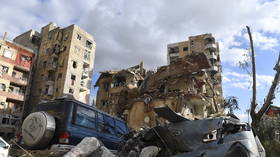‘Chaos & lawlessness’: The West’s Libyan legacy

With peace talks between Libyan political factions beginning in Geneva, seeking to forge a unity government in a country crippled by chaos and lawlessness, the West’s role in the destabilization should be questioned.
Out of the many examples of Western military campaigns in recent times, none has been more grievous or disastrous than NATO’s 2011 intervention in Libya, which only helped turn the country into a failed state.
Unleashed under the auspices of UN Security Council Resolution 1973 – a mandate abused to effect the toppling of the Gaddafi regime in Tripoli despite its official and stated objective of ‘protecting civilians’ – NATO’s intervention in the form of airstrikes did not result in the democratic society so gushingly anticipated by those responsible and their supporters.
Instead it ushered in crisis and chaos as Libyan society promptly fragmented and broke down into the tribal, sectarian, and brutal internecine conflict that has turned a once-functioning state and society into a dystopia into which Islamic State (IS) has gained a foothold and been able to spread its malign influence. The result has been the usual barbaric ritual beheadings by IS of prisoners, the persecution of women and minorities, and in June the slaughter of 37 tourists in Tunisia in a terrorist attack prepared and organized across the border in Libya.
Here it should be noted that there were no terrorist training camps in Libya and IS was not a presence there prior to NATO’s military intervention and the toppling of the Gaddafi regime in 2011.
Another grievous consequence of the chaos in Libya is a refugee/migrant crisis that has seen tens of thousands desperate to escape the hell the country has become, willing to risk a perilous voyage across the Mediterranean in barely-seaworthy vessels in order to do so. Hundreds, perhaps thousands, have drowned in the attempt thus far with more sure to follow.

Not that they are welcomed with open arms and given sanctuary if they somehow manage to survive the voyage and reach mainland Europe. On the contrary, not merely content with helping to destabilize and destroy Libya, European governments have shamefully denied rightful refugee status to those who are naturally attempting to flee the hell into which they have been plunged. Instead these desperate people are being demonized and dehumanized, treated not as human beings fleeing war and persecution, but as criminals intent on staging an invasion. British Prime Minister, David Cameron, recently described them as constituting a “swarm.”
The reason it is important to record this litany of disaster in such detail is to counter the moves that are afoot in European capitals and in Washington, as the Libyan talks in Geneva begin, to claim that Libya is on the way to the becoming the flowering example of democracy it was claimed the 2011 ‘revolt’, aided by NATO, was certain to create.
In this regard the US Special Envoy to Libya, Jonathan Winer, recently had the astounding temerity to claim in an article that appeared on the US State Department’s official blog that the overthrow of Gaddafi was a “moment of pride for Libyans and those who supported them.”
By “those who supported them,” Winer is obviously referring to the US and its European allies, responsible for the previously-mentioned NATO intervention without which the so-called Libyan rebels would not have succeeded, given that their revolt did not have the mass support of the Libyan people, which is just one of the many myths conjured up in order to support the toppling of the Gaddafi regime.
But leaving that aside for a moment, the gall of US and European leaders and their functionaries in claiming Gaddafi’s overthrow should be considered a source of pride is truly staggering – not only because it has ushered in the aforementioned chaos and destabilization, but also because only just prior to Gaddafi’s overthrow the West was doing lucrative business with the Libyan leader and referring to him in the most convivial terms.
If Gaddafi was the ‘tyrant’ the US claimed he was upon his death at the hands of a mob, what was he before when President Obama was shaking hands with him at the G8 Summit in Italy in 2009, to which the Libyan president was invited as head of the African Union?
The only word to describe the ease with which the West turned on its former trade partner and ‘friend’ is opportunism. The truth is that by the time the Arab Spring spread to Libya it had reached the end of its momentum, lacking the popular support it had enjoyed in Tunisia and Egypt before it. When Gaddafi claimed that in Libya the revolt in Benghazi in the east was being led by Al-Qaeda, governments and opinion formers the West scoffed, preferring to regard the rebels as democrats. Of course there were those among the rebels who were fighting to bring about democratic change, but they were by no means the driving force of the struggle.
In June 2011, for example, a few months before Colonel Gaddafi met his grisly end, the influential American conservative magazine, National Review, carried a story on its website citing a report compiled by two French think tanks. It revealed that “jihadists have played a predominant role in the eastern Libyan rebellion against the rule of Muammar Gaddafi, and that ‘true democrats’ represent only a minority in the rebellion.”
Yet despite this we have Washington, in the shape of the aforesaid US Special Envoy to Libya, Winer, trying to claim that in 2015 Libya is on the verge of emerging from the abyss of terrorist violence, social fragmentation, and lawlessness into a Western-style democracy underpinned by the rule of law.
“Many Libyans are working to bridge differences and to realize the democratic aspirations of the revolution for which so many sacrificed so much. These efforts reflect the common desire to live in a unified country with other Libyans who reject violence and seek a civil, democratic state committed to human rights and the rule of law,” Winer writes.
Only someone reaching deep down into a well of desperation and denial could come up with this analysis. Libya was turned into a failed state by Washington and its allies, yet rather than admit the fact they are intent on claiming that the country is merely going through a difficult process of transition towards democracy. The tens of thousands of men, women and children who have risked, and are still risking, their lives trying to escape across the Med in anything that will carry them offer a far stronger rebuke to this staggering and, it has to be said, bonkers narrative than any words ever could.
The Libyan people are victims of the West’s crude attempt to hijack the momentum of the Arab Spring at the very point at which it came to the end of its reach. The speed of its spread and mass support in Tunisia and Egypt, where it succeeded in toppling two pro-Western dictators in the shape of Ben Ali and Hosni Mubarak, caught Washington and its allies by surprise.
Libya is where they decided to try and place themselves at the head of its momentum, motivated not by the desire to help effect democratic change, but to ensure that the extensive and lucrative oil exploration contracts and economic ties forged with the Gaddafi regime were protected and upheld after its demise.
This was their motivation and a failed state is the result. While, of course, a world interested in justice and human rights supports the attempt to forge a unity Libyan government that can start to rebuild the country and achieve a measure of stability, any such attempts that involve those responsible for the disaster in the first place have to be viewed with caution.
Washington and Europe have never been a source of stability in the Middle East or North Africa. On the contrary, their presence and double dealing has only ever brought people living there unremitting suffering and despair.
The statements, views and opinions expressed in this column are solely those of the author and do not necessarily represent those of RT.
The statements, views and opinions expressed in this column are solely those of the author and do not necessarily represent those of RT.













